The finalists for the AgriScot farms of the year have been announced in the beef, sheep, arable, dairy and young business categories. The finalists will be revealed on Wednesday 20 November at the AgriScot event at Inglston Edinburgh.
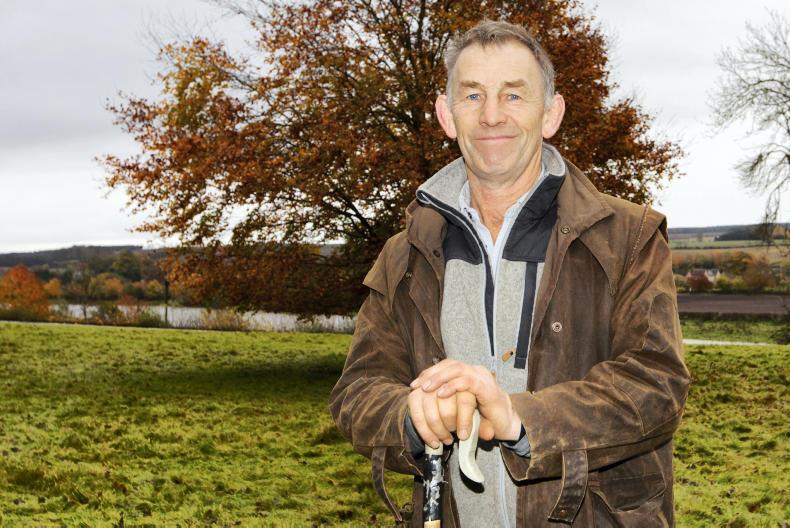
Sheep finalists: Sharpitlaw.
Sharpitlaw is based in Kelso, where Kevin Stewart farms 500ha on three units from a base at Sharpitlaw. Predominantly upland units, Kevin runs 1,250 ewes, 315 gimmers, 970 ewe lambs, 1,080 feeding lambs, 520 ram lambs and 100 summer-grazing cattle. The sheep enterprise is based on a forage production system, coupled with modern sheep genetics and home-produced forage. Kevin’s flock comprises predominantly of Highlander ewes – a composite breed originating in New Zealand in conjunction with Suffolk, Aberblack and Abermax. 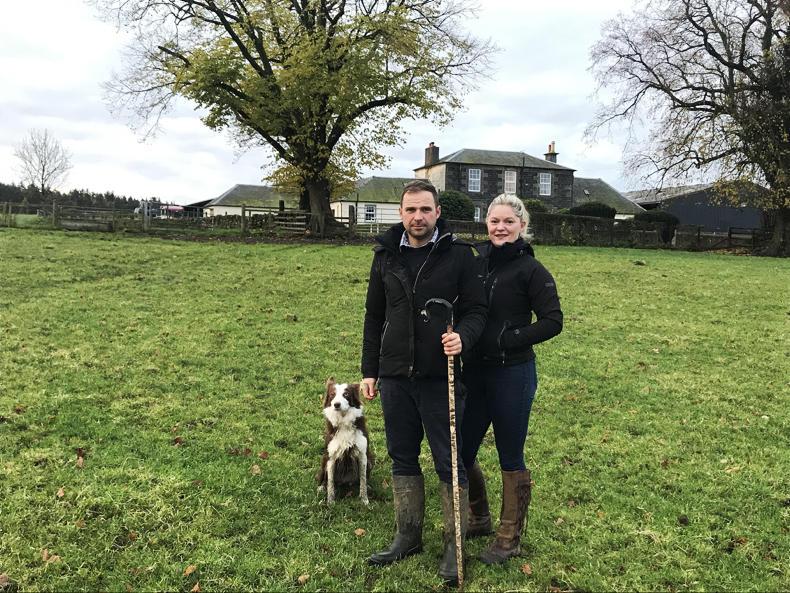
Sheep finalist: Orcahardton Farm.
Orcahardton Farm, South Ayrshire, is run by James Nisbet, with the enterprise comprising of 1,350 breeding sheep, including 200 Scotch Blackie ewes, 300 Suffolk mules, 500 Scotch Mules, 300 breeding ewe lambs, 15 pure Suffolk ewes, 25 Bluefaced Leicester ewes and 10 pure Texel ewes. Sorn Mains also have 50 stock tups, which include a mixture of pure Texel, pure Suffolk and Bluefaced Leicesters. Swinside Townfoot, Jedburgh, is 423 acres, owned by Peter and Vicki Hedley, where they run 100 North Country Cheviot park ewes and an additional 250 acres on a grazing agreement. Swinside Townfood uses a simple system, with all sheep run in a closed flock system, other than the purchase of Cheviot tups and a Blackfaced Leicester stock tup. Swinside Townfoot also buy sin 100 to 150 spring-born calves in the autumn, which complement the sheep and the farm’s grassland management plan.
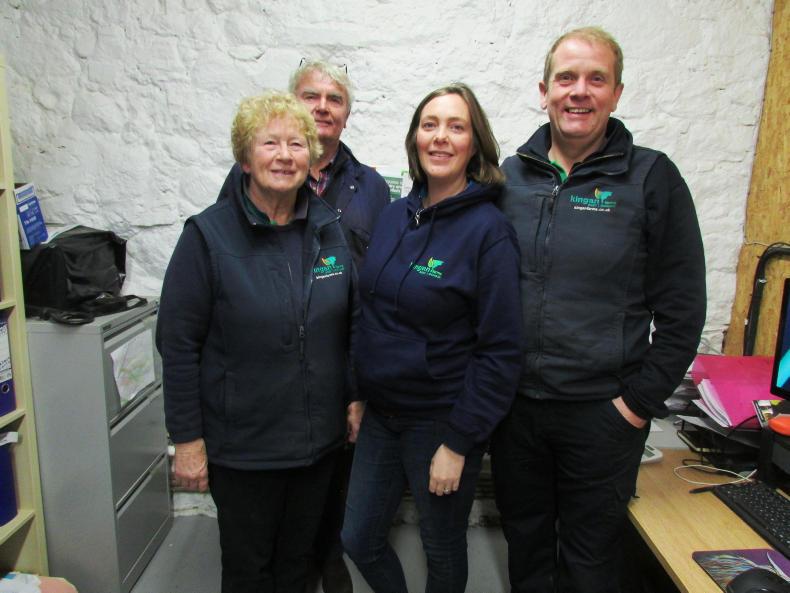
Beef finalist Kingan Farms.
Kingan Farms is a family partnership, a 475ha owned and tenanted enterprise across four locations in Dumfries. The Kingan family run a beef finishing system, with a turnover of approximately 1,400 cattle per year – a mixture of continental and native breeds. On arrival, all cattle are weighed, tagged with an EID and batched, dependent on weight. Kingan Farms are self-sufficient with grazing, grass silage and whole crop, with straw and additional locally grown barley the only regular external purchase. The Kingan family are proud of their close working relationships from calf producer to processor to meet the needs and quality expected by end users.
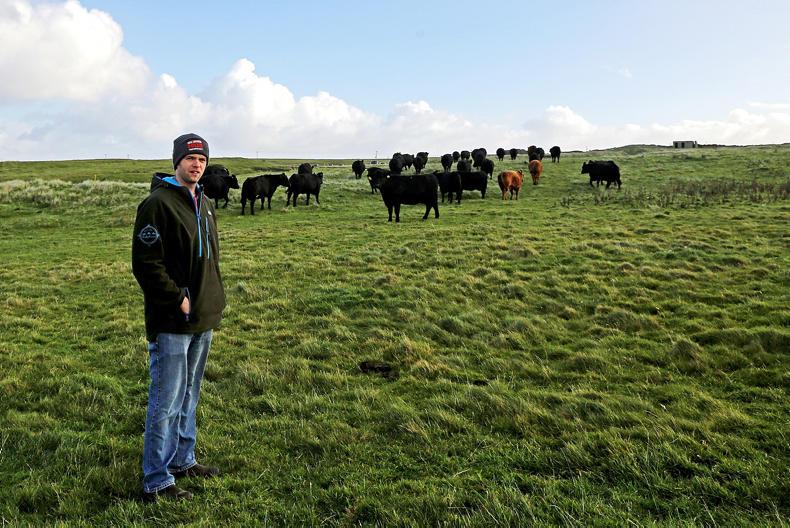
Beef finalist: Scholland.
Scholland is a 350ha farm on Shetland, where Mr Leslie farms in partnership with his father John and runs 80 Aberdeen Angus suckler cows with progeny predominately finished and sold through a local butcher shop. Scholland is also home to 900 breeding ewes which are a mixture of Shetland, Cheviot and Texel, with Suffolk used as terminal sire. During the summer months cows and calves operate in a leader-follower grazing system. In addition, Mr Leslie has adopted a deferred grazing system for his suckler cows after winter which has resulted in a saving of £92 per cow in wintering feed and machinery costs.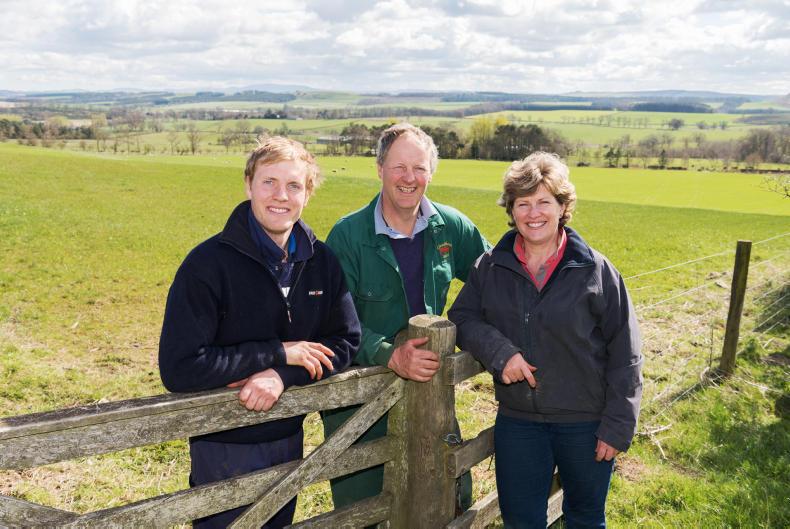
Beef finalist: Firth Farm.
Firth Farm in Melrose is a tenanted partnership between Kath and Rob Livesey and their son Iain. Firth Farm is an approximately 300ha mixed enterprise near Lilliesleaf, Melrose, where they run 100 pedigree Salers suckler cows, 60 additional cross-bred store calves purchased annually from the Isle of Mull all sired by Firth Farm bulls, as well as 1,000 mule ewes. Firth Farm have utilised social media as an effective marketing tool and regularly post photos and updates to boost their profile, which has resulted in cattle sold through the platform. Baltier Farm, Whithorn, Newton Stewart, where the third generation of the Douglas family now milk their 580-cow herd of high-yielding Holsteins three times per day. Drum Farm, Beeswing, Dumfries, farmed by the Harvey family who previously won the award in 2012.Ernespie, Castle Douglas, where David McMiken milks a herd of 290 cows in partnership with his parents.Craig Peddie owns and farms 196ha at Cornceres, Anstruther, where he grows winter and spring cereals, oilseed rape and beans and rents land for potatoes.John Weir owns 300ha at Lacesston, Gateside, where the focus is on potatoes, but he also grows cereals and finishes beef cattle.The 1,165ha Balbirnie Home Farms at Freuchie, owned by the Balfour family, is managed by David Aglen, who is responsible for all the cereals, vegetables, grass and fodder/cover crops grown on the estate, as well as livestock enterprises.The skilled young agri-business finalists
Martin Flood – from a family beef farm in Co Monaghan, Ireland. Martin is currently in his third year of the BSc Agriculture course at SRUC Ayr and has a keen interest in grassland management. During his time in Scotland, Martin has also gained experience milking on local dairy farms.Sarah Hodge - from a family farm in East Lothian. Sarah is a fourth year Rural Business Management student at SRUC Edinburgh. On completion of her course, she aims to enter a career within land management and has already successfully completed a summer placement with Galbraith. Jack Cooper – Jack is in his fourth year of the BSc Agriculture course at SRUC Aberdeen and combines his studies with part-time work on a farm local to the campus. In entering the competition, Jack is looking to further develop his business management skills to add to extensive on-farm experience in both the arable and livestock sectors. Jack’s long-term goal is to work as a farm manager.
The finalists for the AgriScot farms of the year have been announced in the beef, sheep, arable, dairy and young business categories. The finalists will be revealed on Wednesday 20 November at the AgriScot event at Inglston Edinburgh.

Sheep finalists: Sharpitlaw.
Sharpitlaw is based in Kelso, where Kevin Stewart farms 500ha on three units from a base at Sharpitlaw. Predominantly upland units, Kevin runs 1,250 ewes, 315 gimmers, 970 ewe lambs, 1,080 feeding lambs, 520 ram lambs and 100 summer-grazing cattle. The sheep enterprise is based on a forage production system, coupled with modern sheep genetics and home-produced forage. Kevin’s flock comprises predominantly of Highlander ewes – a composite breed originating in New Zealand in conjunction with Suffolk, Aberblack and Abermax. 
Sheep finalist: Orcahardton Farm.
Orcahardton Farm, South Ayrshire, is run by James Nisbet, with the enterprise comprising of 1,350 breeding sheep, including 200 Scotch Blackie ewes, 300 Suffolk mules, 500 Scotch Mules, 300 breeding ewe lambs, 15 pure Suffolk ewes, 25 Bluefaced Leicester ewes and 10 pure Texel ewes. Sorn Mains also have 50 stock tups, which include a mixture of pure Texel, pure Suffolk and Bluefaced Leicesters. Swinside Townfoot, Jedburgh, is 423 acres, owned by Peter and Vicki Hedley, where they run 100 North Country Cheviot park ewes and an additional 250 acres on a grazing agreement. Swinside Townfood uses a simple system, with all sheep run in a closed flock system, other than the purchase of Cheviot tups and a Blackfaced Leicester stock tup. Swinside Townfoot also buy sin 100 to 150 spring-born calves in the autumn, which complement the sheep and the farm’s grassland management plan.

Beef finalist Kingan Farms.
Kingan Farms is a family partnership, a 475ha owned and tenanted enterprise across four locations in Dumfries. The Kingan family run a beef finishing system, with a turnover of approximately 1,400 cattle per year – a mixture of continental and native breeds. On arrival, all cattle are weighed, tagged with an EID and batched, dependent on weight. Kingan Farms are self-sufficient with grazing, grass silage and whole crop, with straw and additional locally grown barley the only regular external purchase. The Kingan family are proud of their close working relationships from calf producer to processor to meet the needs and quality expected by end users. 
Beef finalist: Scholland.
Scholland is a 350ha farm on Shetland, where Mr Leslie farms in partnership with his father John and runs 80 Aberdeen Angus suckler cows with progeny predominately finished and sold through a local butcher shop. Scholland is also home to 900 breeding ewes which are a mixture of Shetland, Cheviot and Texel, with Suffolk used as terminal sire. During the summer months cows and calves operate in a leader-follower grazing system. In addition, Mr Leslie has adopted a deferred grazing system for his suckler cows after winter which has resulted in a saving of £92 per cow in wintering feed and machinery costs.
Beef finalist: Firth Farm.
Firth Farm in Melrose is a tenanted partnership between Kath and Rob Livesey and their son Iain. Firth Farm is an approximately 300ha mixed enterprise near Lilliesleaf, Melrose, where they run 100 pedigree Salers suckler cows, 60 additional cross-bred store calves purchased annually from the Isle of Mull all sired by Firth Farm bulls, as well as 1,000 mule ewes. Firth Farm have utilised social media as an effective marketing tool and regularly post photos and updates to boost their profile, which has resulted in cattle sold through the platform. Baltier Farm, Whithorn, Newton Stewart, where the third generation of the Douglas family now milk their 580-cow herd of high-yielding Holsteins three times per day. Drum Farm, Beeswing, Dumfries, farmed by the Harvey family who previously won the award in 2012.Ernespie, Castle Douglas, where David McMiken milks a herd of 290 cows in partnership with his parents.Craig Peddie owns and farms 196ha at Cornceres, Anstruther, where he grows winter and spring cereals, oilseed rape and beans and rents land for potatoes.John Weir owns 300ha at Lacesston, Gateside, where the focus is on potatoes, but he also grows cereals and finishes beef cattle.The 1,165ha Balbirnie Home Farms at Freuchie, owned by the Balfour family, is managed by David Aglen, who is responsible for all the cereals, vegetables, grass and fodder/cover crops grown on the estate, as well as livestock enterprises.The skilled young agri-business finalists
Martin Flood – from a family beef farm in Co Monaghan, Ireland. Martin is currently in his third year of the BSc Agriculture course at SRUC Ayr and has a keen interest in grassland management. During his time in Scotland, Martin has also gained experience milking on local dairy farms.Sarah Hodge - from a family farm in East Lothian. Sarah is a fourth year Rural Business Management student at SRUC Edinburgh. On completion of her course, she aims to enter a career within land management and has already successfully completed a summer placement with Galbraith. Jack Cooper – Jack is in his fourth year of the BSc Agriculture course at SRUC Aberdeen and combines his studies with part-time work on a farm local to the campus. In entering the competition, Jack is looking to further develop his business management skills to add to extensive on-farm experience in both the arable and livestock sectors. Jack’s long-term goal is to work as a farm manager. 













SHARING OPTIONS: